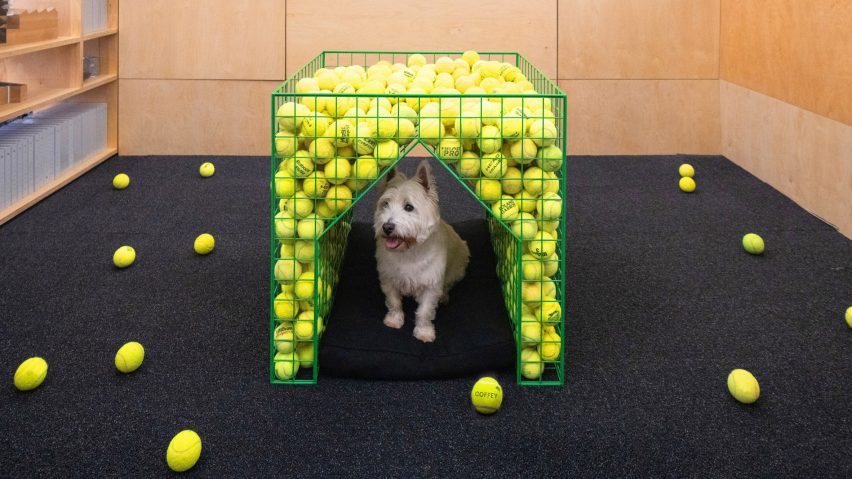
Coffey Architects uses "serious architectural element" to create playful dog kennel
London studio Coffey Architects has created Fetch, an architectural kennel for its office dog Lucky that is made from a green gabion basket and filled with hundreds of tennis balls.
According to the studio, the aim of the design was to create a joyful structure that would fit in with the style of its office, while also offering its "furry companion" a cosy retreat.
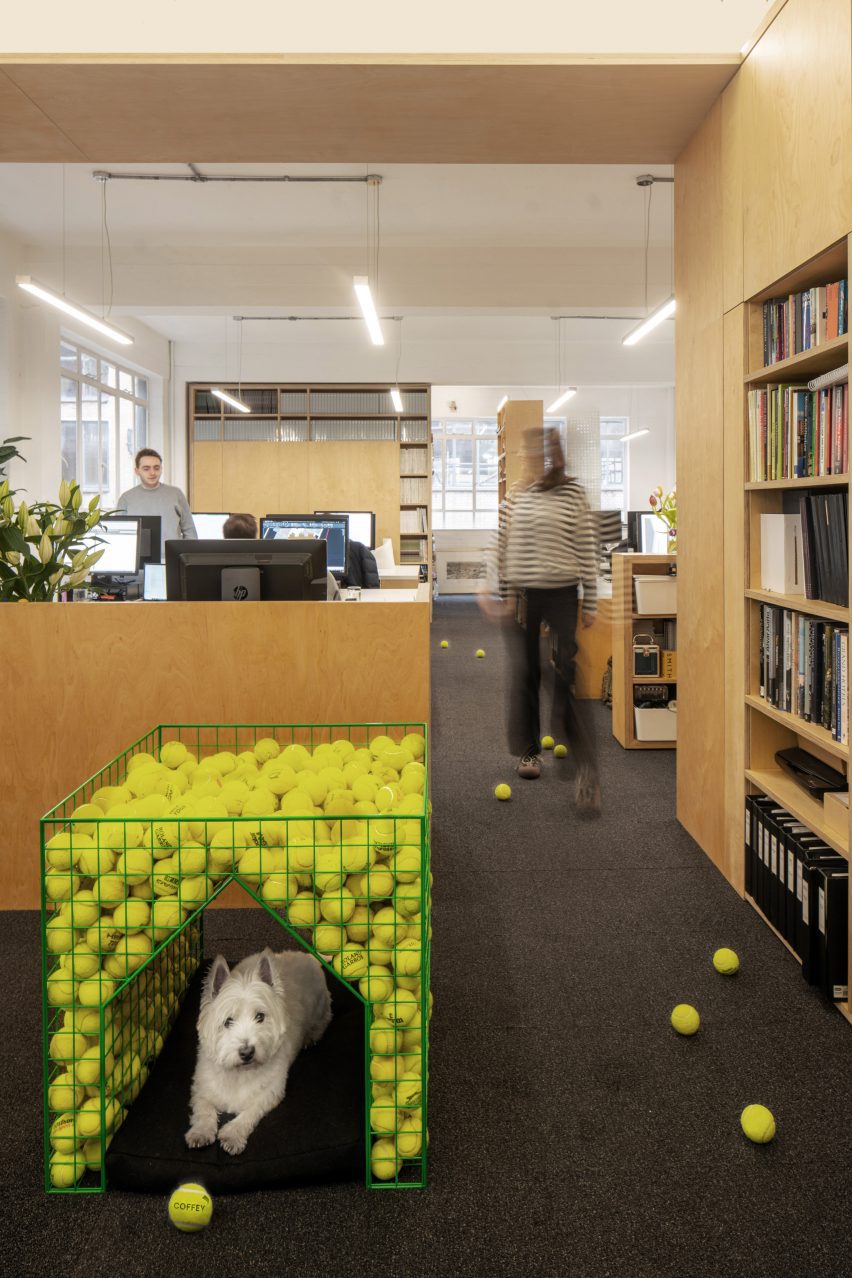
Aiming to use "materials in ways they aren't really intended to be used", Coffey Architects opted for a gabion, or mesh basket, to form the kennel.
Gabions are typically filled with rocks and used to form walls in architecture and landscapes, but using one for the project enabled the studio to create a playful structure on a tight budget.
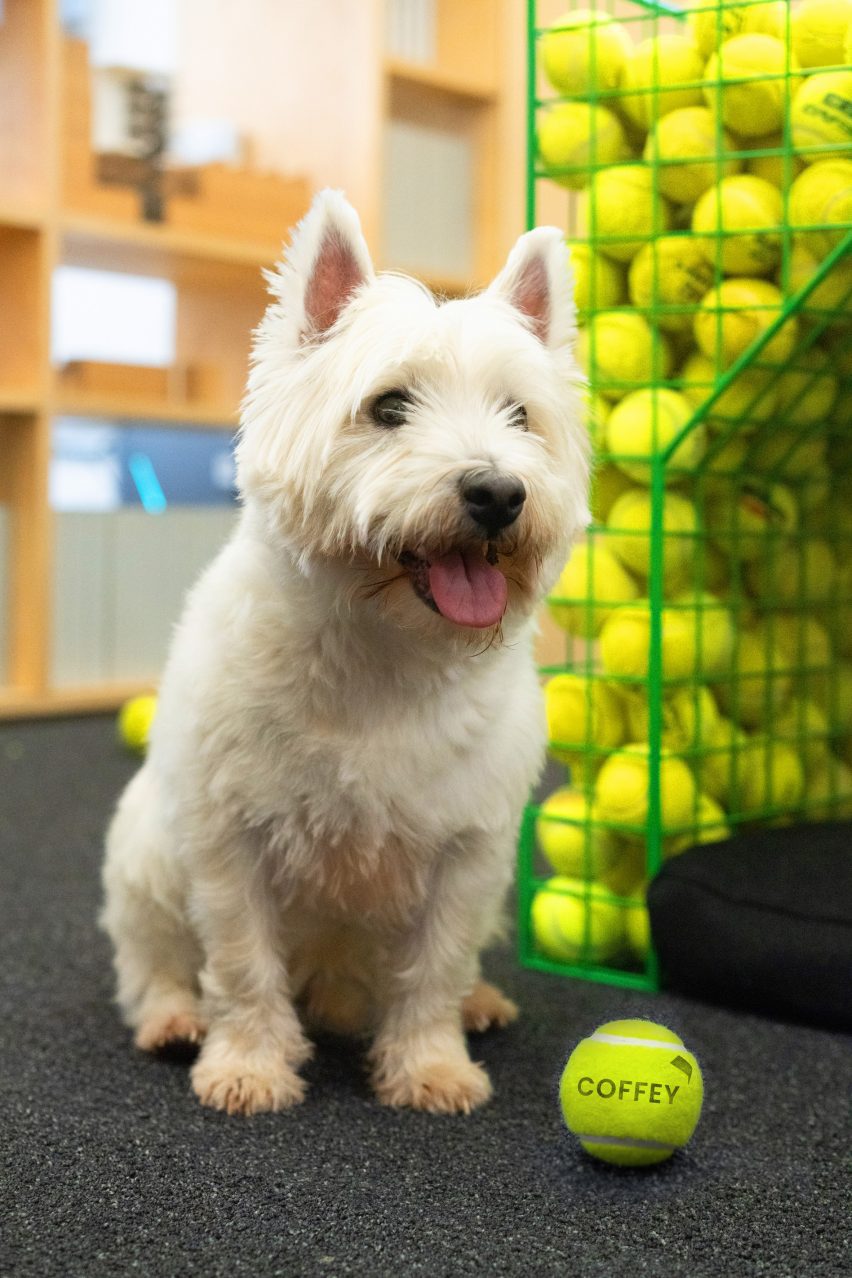
"We often look for the simplest idea and work to change it into something with a bit of humour," studio director Michael Henriksen told Dezeen.
"So we took this dry and serious architectural element we're all familiar with and swapped out its key components with some joyful additions," he continued.
"The clunky, solid rocks became vibrant, bouncing balls, and the grey mesh was transformed with bright green."
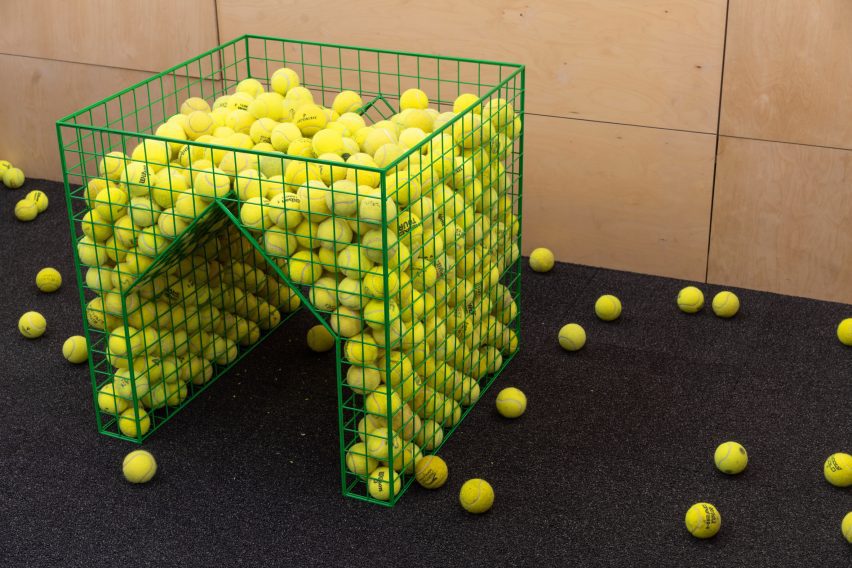
Fetch was designed by Coffey Architects as part of Barkitecture, a creative kennel competition held annually at Goodwoof – an annual event at Goodwood estate that is dedicated to dogs.
This year's theme for the competition was called A Companion Piece – Dogs at Work and invited designers to create a kennel with a budget of £250.
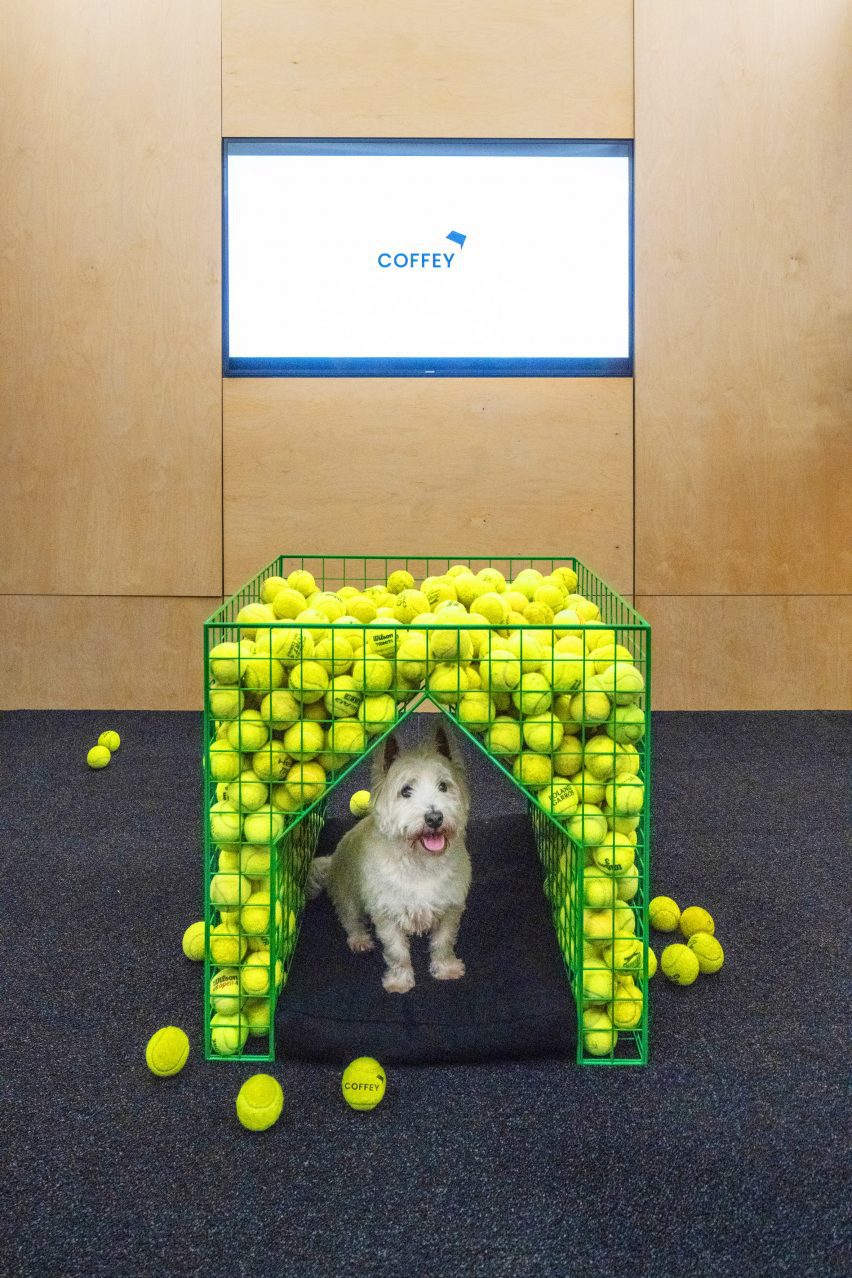
Deliberately simple in form, the cube-shaped kennel is punctured by an opening that resembles a house with a pitched roof.
It was manufactured by welder Top Dog Custom Cages to a size that Coffey Architects based the size of its current office dog, a West Highland White Terrier (Westie) called Lucky.
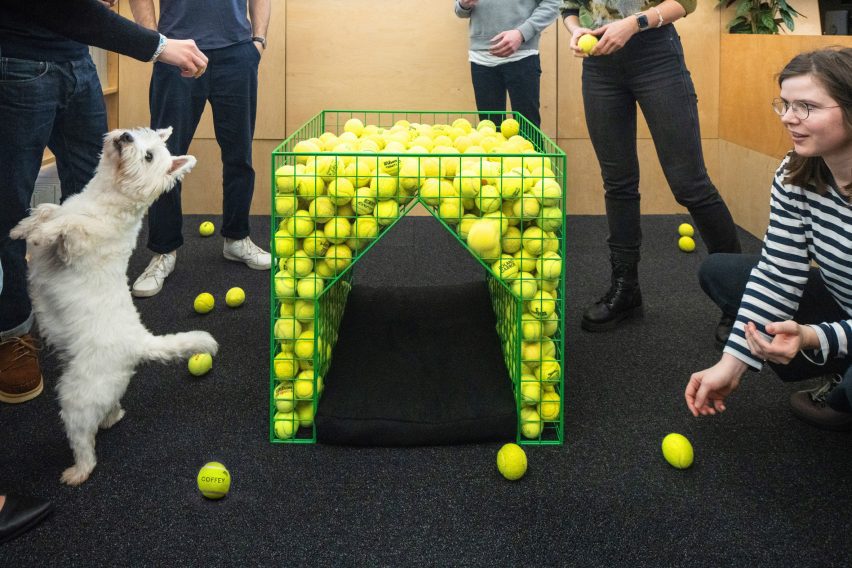
Rather than using the traditional grey metal finish of a gabion, the studio chose to finish it in a bright green that complemented the tennis balls.
"We like the idea of a cheerful, inviting pop of colour and tennis balls that are calling out to be thrown around in our fairly refined studio setting," said Henriksen.
Approximately 500 tennis balls, donated by sports brand Wilson and sports clubs Roehampton Club and Winchester Racquets and Fitness, are stored around the opening in the structure.
However, the studio intends for the kennel to also be filled with other items over time – including Lucky's chew toys, old shoes or even some calming herbs such as lavender or rosemary.
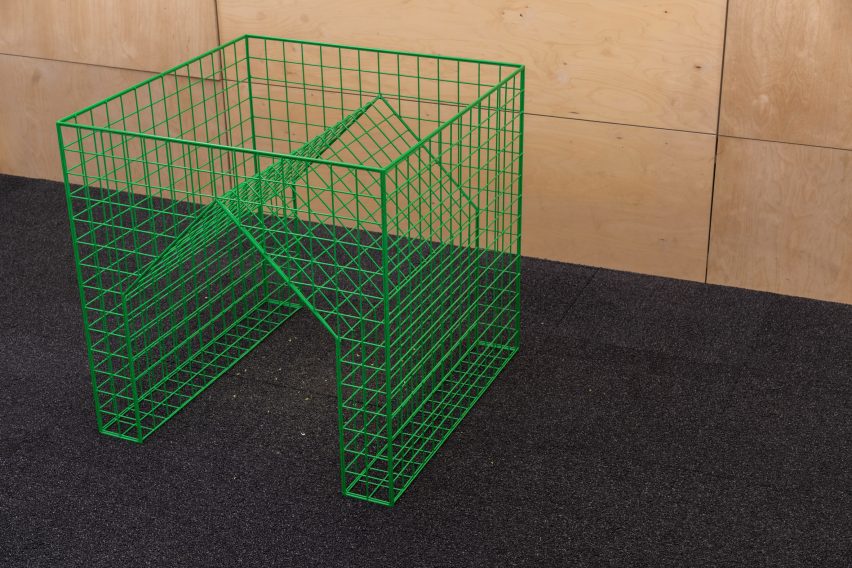
According to Henriksen, while Lucky the office dog does not appear to be "too bothered" by the structure yet, it was a bigger success at a recent Barkitecture preview event.
"We particularly enjoyed seeing a little sausage dog walking from kennel to kennel trialling them all, it was obvious to see he preferred ours!" he said.
Other creatives participating in the Barkitecture competition include the likes of Foster + Partners, Hopkins Architects, Jony Ive and Gianni Botsford Architects.
Coffey Architects was founded in London in 2005 by British architect Phil Coffey. Other recent projects by the studio include the Digi-Tech Factory in Norfolk and a London apartment covered in 30,000 wooden blocks.
Update 17/5/2023:
Since Fetch was revealed, Dezeen commenters have noticed the similarity between the design and another house-shaped kennel created by architecture studio Denizen Works for the BowWow Haus London initiative in 2018. However, both Denizen Works and Coffey Architects claim this is coincidental.
"We've discussed the similarities with Coffey Architects and are more than happy that there has not been any skullduggery, only two good offices taking different paths to find the same idea, albeit we found it first," said Denizen Works. "If anything, I hope the added publicity will push up the price of their kennel. It's for charity after all."
A spokesperson for Coffey Architects added that it was "obviously unaware of the Denizen Works kennel before designing, manufacturing and submitting ours to Goodwoof".
"Dogs, balls, homes and pitched roofs are universal pairings, so it’s easy to see how we both got there," the studio said. "Coffey always designs from first principles and any accusations of plagiarism are really disappointing."
Goodwoof has also dismissed accusations of plagiarism, describing the similarities as "an unusual coincidence".
"Coffey Architects came up with a number of different ideas before settling on ‘Fetch’," Goodwoof said. "Any resemblance to a similar concept must be an unusual coincidence – it just reflects the worldwide passion for creating amazing spaces for dogs!"
The photography is by Phil Coffey.